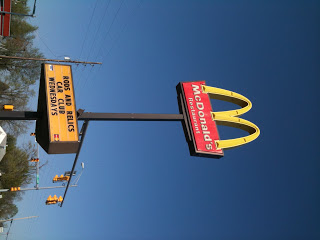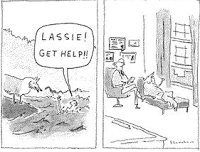Medieval History
 The world really is all interpretation. I nearly swerved off the road when I saw "Rods and Relics" advertised at a local McDonald's (and just in time for Easter!!!) - but then purposefully drove into the parking lot to take a picture, much to the kids' mortification. I know that, in the end, it's about people with similarly old cars getting together at just about the only place in town to do so, but it still made our little town fill with the strange possibilities of Things Medieval for a fleeting second. I am still relishing thinking of the word "Relics" broadcast from a McDonald's sign. Relics. McDonald's. That's really funny - I suppose because it can't possibly be taken literally. But I understand the pleasure and resistance of being "stubbornly literal" (a wonderful phrase/ethos articulated by Vin Nardizzi in a paper at the D.C. conference that was so awesome).
The world really is all interpretation. I nearly swerved off the road when I saw "Rods and Relics" advertised at a local McDonald's (and just in time for Easter!!!) - but then purposefully drove into the parking lot to take a picture, much to the kids' mortification. I know that, in the end, it's about people with similarly old cars getting together at just about the only place in town to do so, but it still made our little town fill with the strange possibilities of Things Medieval for a fleeting second. I am still relishing thinking of the word "Relics" broadcast from a McDonald's sign. Relics. McDonald's. That's really funny - I suppose because it can't possibly be taken literally. But I understand the pleasure and resistance of being "stubbornly literal" (a wonderful phrase/ethos articulated by Vin Nardizzi in a paper at the D.C. conference that was so awesome).
Being stubbornly literal embraces words themselves and engages in every impossibility they might present. It's a willful act of interpretation that prizes language over culture, in the case of relics at McDonald's, of language over reality. Being stubbornly literal joyfully seizes immediate meaning and doesn't let go. I'm doing it with the Chaucer stained glass paper and thinking through his idea of a stained glass window containing the entire epic of Troy. Doing so provokes me to think about the boundaries of epic (when, really, does the epic of Troy begin? When, actually, does it end?). The key is that the result of being stubbornly literal is not itself necessarily literal. Other things ensue. There are occasions to think about the limit of the greatest foundational myths (the French argued for a shared ancestry with the Turks through the Trojans until well into the 16th century), for instance.
There is also humor. When I was learning to drive stick shift, I read (yes, a book was involved) the phrase "Depress the pedal." To this day, I can hear Mac saying "You're just a small pedal, no one can really see you down there; Anne's going to step on you over and over until it becomes automatic and she doesn't even have to think about it. Your very existence is predicated upon her foot's unthinking memory." I depress that poor pedal every day. Don't even ask me about the civic league's invitation to "Patronize the town square."
There are also struggles for power and right. One of the most insidious and insistent claims of medieval anti-Semitism was the conviction that Jews read the Bible literally (to the letter), while Christians read it anagogically (through interpretation). This is why, Kathleen Biddick explains in her excellent book The Typological Imaginary, it is the "Talmudic Jew" (the one who interprets) who is suppressed in the Middle Ages; this is why it is the Talmud that is burned in the Middle Ages. Christian interpretation is, in a very real sense here, a kind of colonialization: taking a resource and making it produce, reframing it so that it contributes to your economy, moral or otherwise. Lectio christiana (the Christian interpretation of non-Christian texts) can turn the coronation hymn of Hezekiah into a prophecy of the birth of Christ. As my dear friend whose "Hebrew Bible" class I'm attending was reading "For to us a child is born, to us a son is given, and the government will be upon his shoulders. And he will be called Wonderful Counselor, Mighty God, Everlasting Father, Prince of Peace" (yep - Isaiah 9:6) all I could hear were the interwoven voices of the choir repeating the words in (it is, isn't it?) Handel's Messiah. The revelation of this course has been to read the text closer to its letter, through the lens of its history. What it might possibly mean to be stubbornly literal about the Bible, I'll want to think on (because no, fundamentalists don't read the Bible literally, they wrench it into horrible, harmful interpretation). Some texts, one might think, resist being taken literally. And of course, an art historian should be asking these questions of images.
 Do kids read more literally? Is this why so many objects speak and act in children's books? Are they the ones to truly understand the freedom of the possibility of language? Are there more impossible texts to consider than those of Passover and Easter?
Do kids read more literally? Is this why so many objects speak and act in children's books? Are they the ones to truly understand the freedom of the possibility of language? Are there more impossible texts to consider than those of Passover and Easter?
- Laughter And Fire
Abraham and Isaac, Chartres Cathedral, 13th c.There is a place where laughter and fire meet, and that is in the story of the Binding of Isaac. (Though one does wonder about the presence of laughter in the union of firestones - Marian Bleeke wonders...
- With An Eye To Babel
Oxford, Bodleian, MS lat. th.b.4, f. 168r. Decretals of Gregory IX, 1234. And so this is where we leave this semester: with an eye to Babel, inspired by good friends, spurred by events, puzzled by ideas, and pushed by desires. For what else is there?...
- Best Conference Ever
Pieter Breughel the Elder The Tower of Babel (1563)What's great about attending an academic conference is that you forget, for just a bit, that you are quite the freak for doing what you do for a living. This conference was all about celebrating...
- Confer!
Wo-ha - I'm in Montréal. There's a 16th-century Conference, which is later than I'm used to, but my gal died in 1531, so fair game, yes? Everything is suspended and strange - and thus wonderful. Lots and lots of work that...
- Debating Relics. Reflections On Relics In The Middle Ages And Problems Of Methodology
Debating relics. Reflections on relics in the Middle Ages and problems of methodology This strand of sessions, emanating from the research (NWO-Vidi) projectMind over Matter. Debates about relics as sacred objects c. 350-c.1150, deals with debates about...
Medieval History
Rods and Relics
Being stubbornly literal embraces words themselves and engages in every impossibility they might present. It's a willful act of interpretation that prizes language over culture, in the case of relics at McDonald's, of language over reality. Being stubbornly literal joyfully seizes immediate meaning and doesn't let go. I'm doing it with the Chaucer stained glass paper and thinking through his idea of a stained glass window containing the entire epic of Troy. Doing so provokes me to think about the boundaries of epic (when, really, does the epic of Troy begin? When, actually, does it end?). The key is that the result of being stubbornly literal is not itself necessarily literal. Other things ensue. There are occasions to think about the limit of the greatest foundational myths (the French argued for a shared ancestry with the Turks through the Trojans until well into the 16th century), for instance.
 |
| Danny Shanahan, available at The New Yorker |
There are also struggles for power and right. One of the most insidious and insistent claims of medieval anti-Semitism was the conviction that Jews read the Bible literally (to the letter), while Christians read it anagogically (through interpretation). This is why, Kathleen Biddick explains in her excellent book The Typological Imaginary, it is the "Talmudic Jew" (the one who interprets) who is suppressed in the Middle Ages; this is why it is the Talmud that is burned in the Middle Ages. Christian interpretation is, in a very real sense here, a kind of colonialization: taking a resource and making it produce, reframing it so that it contributes to your economy, moral or otherwise. Lectio christiana (the Christian interpretation of non-Christian texts) can turn the coronation hymn of Hezekiah into a prophecy of the birth of Christ. As my dear friend whose "Hebrew Bible" class I'm attending was reading "For to us a child is born, to us a son is given, and the government will be upon his shoulders. And he will be called Wonderful Counselor, Mighty God, Everlasting Father, Prince of Peace" (yep - Isaiah 9:6) all I could hear were the interwoven voices of the choir repeating the words in (it is, isn't it?) Handel's Messiah. The revelation of this course has been to read the text closer to its letter, through the lens of its history. What it might possibly mean to be stubbornly literal about the Bible, I'll want to think on (because no, fundamentalists don't read the Bible literally, they wrench it into horrible, harmful interpretation). Some texts, one might think, resist being taken literally. And of course, an art historian should be asking these questions of images.
- Laughter And Fire
Abraham and Isaac, Chartres Cathedral, 13th c.There is a place where laughter and fire meet, and that is in the story of the Binding of Isaac. (Though one does wonder about the presence of laughter in the union of firestones - Marian Bleeke wonders...
- With An Eye To Babel
Oxford, Bodleian, MS lat. th.b.4, f. 168r. Decretals of Gregory IX, 1234. And so this is where we leave this semester: with an eye to Babel, inspired by good friends, spurred by events, puzzled by ideas, and pushed by desires. For what else is there?...
- Best Conference Ever
Pieter Breughel the Elder The Tower of Babel (1563)What's great about attending an academic conference is that you forget, for just a bit, that you are quite the freak for doing what you do for a living. This conference was all about celebrating...
- Confer!
Wo-ha - I'm in Montréal. There's a 16th-century Conference, which is later than I'm used to, but my gal died in 1531, so fair game, yes? Everything is suspended and strange - and thus wonderful. Lots and lots of work that...
- Debating Relics. Reflections On Relics In The Middle Ages And Problems Of Methodology
Debating relics. Reflections on relics in the Middle Ages and problems of methodology This strand of sessions, emanating from the research (NWO-Vidi) projectMind over Matter. Debates about relics as sacred objects c. 350-c.1150, deals with debates about...
